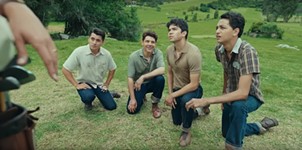SXSW Eco Wrap
“Nature doesn’t need people, People need nature”
By Jessi Cape, 7:00AM, Thu. Oct. 9, 2014
In its fourth year, SXSW Eco represents a shift in the world of environmentalism, with the focus increasingly upon the human cost of climate change.
SXSW Director of Technology Scott Wilcox opened the conference by introducing a new short film series, produced by Conservation International and Lee Clow, Nature Is Speaking: “This campaign does something really smart. It aims to change the current dialogue around environmental issues by making saving the environment focus more squarely on human well-being.” Big Hollywood names personify elements of nature, and the first roll-out features Julia Roberts as Mother Nature, her defiant tone delivering a powerful message.
“I don’t really need people, but people need me. Yes, your future depends on me. When I thrive, you thrive. When I falter, you falter. Or worse.”
The conference, noted for its leadership in green innovation, certainly offered an array of tech-based and sustainability-centric panels and mentorships, but applying data-driven research on how issues of inequality, diversity, and funding complicate traditional environmental problems – such as sea level rise, food scarcity, and air pollution – seemed to rope in a whole new batch of progressive thinkers.
“It took tenacity, it took perseverance, and it took guts and grit to get these issues moved out of the invisibility to [become] issues that resonate across the U.S., [and] also the globe,” said Professor Robert Bullard during his keynote address Monday, Oct. 6. Considered the father of environmental justice, the longtime university professor and author of 18 books offered three words to sum up the fight for climate justice: urgency, hope, and optimism.
In a succinct history lesson on the birth of national environmental justice – described as a convergence of civil rights and sustainability – he used photographs and maps to demonstrate overall indicators of quality of life. “Yes, the South is different,” Bullard explained. “The best predictor of health and quality of life is zip code … and that should not be.” Combine a disproportionately greater risk for disasters due to climate vulnerability and economic disparity with a historically high risk of social vulnerability, and the southern United States – Texas included – is a hot spot for environmental justice work.
“When we begin to formulate policies and strategies for addressing these many complexities, we have to bring the environmental justice and climate justice frame – the environments where we live, work, play, learn, worship, as well as the physical and natural world. When we talk about sustainability, we have to address these equity issues,” explained Bullard. “We have to plan for resilient communities by providing resources so that those communities can do for themselves, speak for themselves, and empower themselves to make change and plan for the future.”
Citing climate change as the top environmental justice issue of the 21st century, as well as the enormous need for engaged youth, Bullard mentioned the current hullabaloo over textbooks. “Texas is trying to tinker with textbooks and make it seem that there is a debate going on about climate change and the human impact. ... The debate is over.”
“Leadership matters,” Bullard continued, and a few hours post-keynote, he was in attendance at the Growing a New Generation of Green Leaders panel, moderated by OBV Media eco-equity strategist Sherrell Dorsey. Bullard snapped an iPad photo of the group, seemingly eager to support the self-described accidental environmentalists.
The panel offered a wealth of insight into youth activism. Creative thinking can bridge gaps and shift societal views of disparities that affect everything from literacy to permaculture, they explained.
“Where we learn matters,” said panelist Jordan Howard, and also how we learn: People begin to “understand sustainability by experiencing sustainability.” Providing environmental education and teaching practical skills – from coding to weatherizing houses – to communities of color and disenfranchised youth, specifically, helps facilitate a strong connection to environmental justice issues. Building on the idea, Brentin Mock – justice editor for Grist.org and the Read, Black, and Green blog – said the “utterly ridiculous” notion that people of color don’t care about environmental issues is something he is out to change. By identifying misconceptions and “elevat[ing] the voices of environmental justice advocates,” the media can help facilitate positive, solutions-based narratives and bring green issues to the mainstream. This same sentiment inspired Neil Cairns to commission over 120 “guilt-free” films about environmental projects.
Cairns moderated the Power of Positive: Stories of Grassroots Change panel, which included four other collaborators on Al Jazeera’s Earthrise series – “a show all about solutions.” From Todd Barber’s work with the Reef Ball Foundation, an NGO teaching global marine reef rehabilitation using technology that stimulates regrowth of microecosystems, to John Carter, a Texas cattle rancher working in the Amazon to create economic incentives for local landowners combating deforestation and enforcing conservation laws, the show “give[s] a voice to visionaries.” Journalist and producer Sylvia Rowley explained the show’s belief in the "power of positive," citing academic research that indicates inundating the public with “doom and gloom” facts is an inadequate and inefficient method to spread environmental awareness. Instead, “hearing about solutions moderates the fear,” she said.
Reiterating Mother Nature’s message loud and clear, Barber said, “We’re not talking about saving the planet. We’re talking about saving ourselves.”
Got something to say on the subject? Send a letter to the editor.
A note to readers: Bold and uncensored, The Austin Chronicle has been Austin’s independent news source for over 40 years, expressing the community’s political and environmental concerns and supporting its active cultural scene. Now more than ever, we need your support to continue supplying Austin with independent, free press. If real news is important to you, please consider making a donation of $5, $10 or whatever you can afford, to help keep our journalism on stands.
Richard Whittaker, Oct. 18, 2016
April 12, 2024
March 14, 2024
SXSW Eco, Environmental justice











